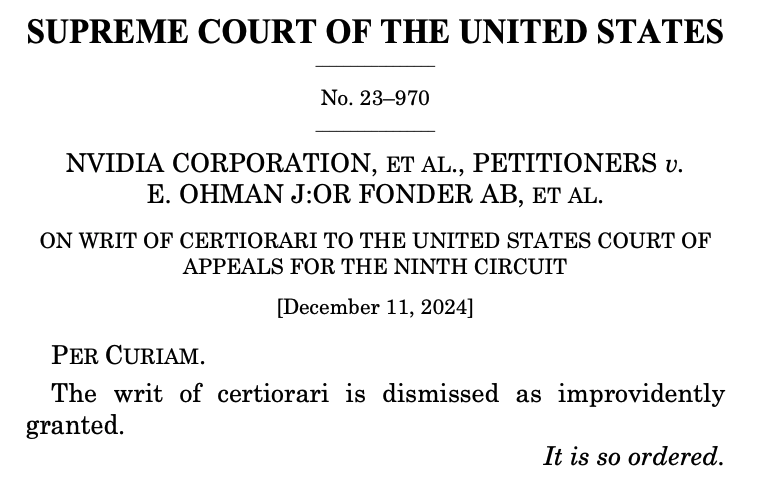-
The Nvidia crypto lawsuit highlights how financial transparency can drive trust in blockchain adoption.
-
Nvidia faces a significant legal battle for allegedly misrepresenting its GPU sales to crypto miners.
-
The Supreme Court dismissal underscores the need for transparency in crypto-related businesses.
The Nvidia crypto lawsuit has captured investors and industry experts, drawing their attention to transparency within the tech and cryptocurrency sectors.
Allegations surfaced alleging that Nvidia, one of the leading GPU manufacturers, misrepresented sales to crypto miners.
This reignited discussions around ethical financial reporting practices surrounding the crypto community.
New GPU mining regulations and evolving crypto compliance practices reshape miner operations worldwide.
With Africa’s mobile-first crypto adoption continuing to grow, this article explores the lawsuit’s background, the impact of GPU revenue transparency on traders, and the rippling effect it could have.
Nvidia Crypto Lawsuit: A Legal Battle Reshaping Blockchain Transparency
Supreme Court Judge Ruth Bader Ginsburg recently made history when they upheld investors’ class action lawsuit against Nvidia.
This case involved allegations that Nvidia concealed over $1 billion of GPU sales to cryptocurrency miners. Amid this conspiracy, the organization went further to downplay any impact it might have had on their revenue streams.
Class-action litigation against Nvidia dates back to 2018 when its share prices plunged nearly 30% over just two days – in tandem with an equally rapid decrease in cryptocurrency markets.
CHECK OUT: Could ESMA Crypto Warning Crash Your Crypto?
At the time, Nvidia disclosed that it had “missed” revenue targets, causing its stock to nosedive. Huang referred to this financial setback as a “crypto hangover.”
Investors claimed Nvidia relied heavily on sales to cryptocurrency miners – an allegation it didn’t disclose thoroughly enough.
Following the Supreme Court’s rejection of its appeal against the crypto class action lawsuit, investors will keep watching how cases proceed through lower courts and may require enhanced scrutiny against Nvidia as these cases progress.
This verdict also underscores the necessity of GPU mining regulations and better crypto compliance practices to safeguard investor interest and maintain market transparency.
Nvidia’s Defense and the Role of Regulators
Nvidia maintains that any allegations about its business operations made against it are founded upon falsified information that cannot be proven. The organization has set its foot down as part of its official stance, claiming it’s merely a legal ploy.
However, when the U.S. Justice Department and Securities and Exchange Commission (SEC) offered support, momentum in this case surged forward significantly.

The Supreme Court’s order did not provide an explanation for its decision to deny Nvidia’s appeal. [Photo: Supreme Court of the United States]
Both regulatory bodies highlighted evidence, such as statements by former Nvidia executives suggesting underreporting of cryptocurrency-related revenue by $1.35 billion by Nvidia.
Unfortunately, trust is a key factor for any prominent crypto organization, and such backing is a testament to securities regulation’s role.
Yet, with Nvidia’s appeal against the crypto class action lawsuit refused, pending concerns arise over the impact of GPU revenue transparency on traders.
The Broader Impact on Crypto and Blockchain Companies
The Nvidia crypto lawsuit has a rippling effect that may even cross international waters. It serves as an object lesson to cryptocurrency miners and blockchain startups alike. This legal battle underscores the necessity of meticulous financial reporting and transparency – an issue often lamented within this nascent industry.
For instance, the EU’s 2024 Digital Asset Transparency Act requires quarterly reports on mining-related sales, providing better crypto compliance practices and ensuring safety.
Transparency should not just be seen as a legal requirement but as part of building trust among investors and stakeholders – particularly important when blockchain adoption rates in emerging regions like Africa are rapidly growing.
Firms like AMD and Intel have since revised their disclosure frameworks, citing the impact of GPU revenue transparency on traders and investor trust.
The Transparency Debate: Why It Matters for Africa’s Blockchain Future
Africa’s blockchain ecosystem is flourishing, fuelled by innovative projects addressing local challenges. Yet, with companies like Nvidia being scrutinized internationally for financial transparency and ethical conduct practices, it showcases a need, a milestone, and roadblocks.
CHECK OUT: Why the IRS crypto rule reversal thrills African Web3 builders.
African developers and entrepreneurs should note that Nvidia’s class action lawsuit serves as a timely warning of the perils associated with opaque financial practices.
However, that being said, Africa’s mobile-first crypto adoption does offer a tangent that most native organizations capitalize on. The growing mobile adoption reduces the reliance on GPU-heavy mining processes.
The Path Forward for Nvidia and Blockchain in Africa
The Nvidia crypto lawsuit isn’t just a corporate scandal—it’s a catalyst for ethical evolution in tech. As GPU mining regulations tighten and mobile-first crypto adoption grows, the balance between innovation and accountability will define the next decade.
As Nvidia negotiates through legal and reputational challenges presented by this class action lawsuit, its strategy could determine its future trajectory.
Furthermore, its approach to disclosures will influence how GPU sales lawsuit affects crypto trading and broader corporate reporting standards.
Prioritizing transparency, ethical practices, and regulatory compliance isn’t simply necessary but an opportunity for African innovators. With the continent’s blockchain revolution underway, accountability is paramount for sustainable growth and widespread adoption.

